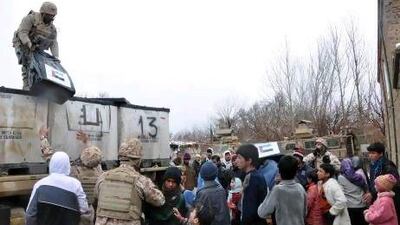In war-torn Afghanistan, the only help one may find is the kind that is most feared: from strangers.
But assistance from the UAE, a fellow Muslim nation, is welcomed.
Since 2003, the Emirates has had an effective presence in the country, ensuring stability as Afghanistan continues to suffer attacks from Taliban insurgents, and delivering aid while helping it to rebuild.
The UAE is one of 49 nations lending assistance to the troubled nation, but is the only Arab country and one of only three Muslim nations doing so.
For these reasons, Emirati troops have an advantage in reaching out to Afghans, said Dr Najibullah Mojadidi, the Afghan ambassador to the UAE.
"Common religion, common culture, is all welcomed," Dr Mojadidi said.
Western troops lacked understanding of the Afghans' conservative culture, best illustrated when US troops raided homes, he said.
"Entering a house during night without knocking was not well received," he said. "But with Muslims, they go in and say 'assalamu alaykum, we just want to search'. Then they would be more cooperative."
The intrusions became such a problem it was recently agreed with the US that only Afghan troops could conduct searches.
"This caused a lot of problems before. It was something very important," Dr Mojadidi said. "Having Muslim countries there is much easier."
According to Lending a Hand, a book compiled by the UAE Armed Forces, Emirati troops were often invited to tea and spoke with Afghans, mostly to convince tribal leaders to promote peace.
The Emirates has also provided US$1.5 billion (Dh5.5bn) in aid to the country, mainly to build roads, schools, mosques and hospitals.
"Advanced healthcare facilities are [now] not more than two hours away" for people in any part of Afghanistan, said the Armed Forces, adding that the child-mortality rate had been reduced by 22 per cent since 2001.
Again bearing in mind cultural sensitivities, the UAE sent female physicians to treat women and children.
The rate of illiteracy has been reduced, and quality of education has improved in the past decade, the Armed Forces said.
Under the Taliban schools were burnt down, but now eight million children go to school, almost half of them female, Dr Mojadidi said.
"This is tremendous progress. Even in parliament, if you look at the upper and lower house, there is a huge number of women representing the people," he said.
In 2001, the number of teachers was 20,000, all of them men. Now it has reached 175,000 - a third of them women.
But even so, "social taboos still affect many women", the Armed Forces said.
Dr Mojadidi said in some cities, such as Kabul, the situation was still difficult. The Taliban were still burning schools, particularly those for girls.
Dr Mojadidi said this was misguided, as Islam called for boys and girls to be educated.
"This is totally against Islam but some in the Taliban don't understand the Quran even," he said. "Most criminals in Afghanistan are from outside the country."
He said Afghanistan was only living in "symptoms of terrorism".
"Where was (Osama) bin Laden found?" Dr Mojadidi asked, by way of an example. "He was found in the heart of one of our neighbour countries, which was giving him support."
He said the country suffered from the actions of its neighbours, Iran and Pakistan, and that the Afghan government was working to convince both countries that stability in Afghanistan was "good for all".
Lack of stability means parents are still afraid to send their children to school but the UAE has built almost a dozen schools, catering to thousands of male and female pupils.
The Emirates is still working on helping Afghans to become independent, following the "don't give a man a fish, teach a man how to fish" model.

